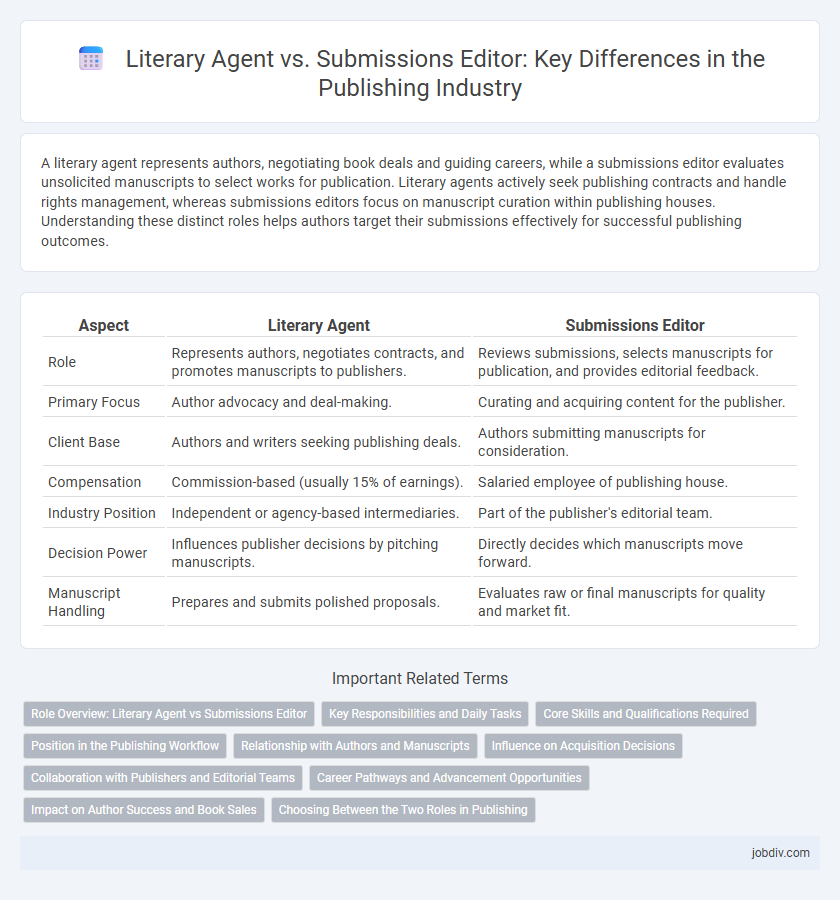A literary agent represents authors, negotiating book deals and guiding careers, while a submissions editor evaluates unsolicited manuscripts to select works for publication. Literary agents actively seek publishing contracts and handle rights management, whereas submissions editors focus on manuscript curation within publishing houses. Understanding these distinct roles helps authors target their submissions effectively for successful publishing outcomes.
Table of Comparison
| Aspect | Literary Agent | Submissions Editor |
|---|---|---|
| Role | Represents authors, negotiates contracts, and promotes manuscripts to publishers. | Reviews submissions, selects manuscripts for publication, and provides editorial feedback. |
| Primary Focus | Author advocacy and deal-making. | Curating and acquiring content for the publisher. |
| Client Base | Authors and writers seeking publishing deals. | Authors submitting manuscripts for consideration. |
| Compensation | Commission-based (usually 15% of earnings). | Salaried employee of publishing house. |
| Industry Position | Independent or agency-based intermediaries. | Part of the publisher's editorial team. |
| Decision Power | Influences publisher decisions by pitching manuscripts. | Directly decides which manuscripts move forward. |
| Manuscript Handling | Prepares and submits polished proposals. | Evaluates raw or final manuscripts for quality and market fit. |
Role Overview: Literary Agent vs Submissions Editor
A literary agent represents authors, negotiating contracts and securing publishing deals to maximize an author's reach and earnings. A submissions editor evaluates unsolicited manuscripts or proposals, deciding which works align with the publisher's catalog and merit further consideration. While the agent advocates for the author's interests, the submissions editor acts as the gatekeeper of the publishing house, ensuring quality and market fit.
Key Responsibilities and Daily Tasks
Literary agents primarily manage author representation, negotiating book deals, and seeking publication opportunities, while submissions editors evaluate manuscript submissions for quality and market potential before recommending them to publishers. Agents maintain relationships with authors and publishers, coordinate contract details, and strategize career growth, whereas submissions editors focus on manuscript assessment, editing for content clarity, and aligning submissions with the publishing house's editorial guidelines. Both roles are critical in the publishing process but differ in their emphasis on client advocacy versus content curation.
Core Skills and Qualifications Required
Literary agents require strong negotiation skills, industry connections, and an in-depth understanding of market trends to secure publishing deals for authors. Submissions editors need keen editorial judgment, attention to detail, and experience evaluating manuscripts to select promising works for publication. Both roles demand excellent communication skills and a deep knowledge of the publishing process, though agents focus more on client representation while submissions editors concentrate on content assessment.
Position in the Publishing Workflow
A literary agent serves as the primary representative of authors, negotiating contracts and guiding the overall publishing strategy, positioned at the crucial pre-submission and deal-making phase. Submissions editors operate within publishing houses, responsible for reviewing manuscripts, managing acquisition pipelines, and making editorial recommendations, situated in the manuscript evaluation and selection stage. This division of roles delineates the transition from author representation to internal editorial choice within the publishing workflow.
Relationship with Authors and Manuscripts
A literary agent serves as a dedicated advocate for authors, managing manuscript submissions, negotiating contracts, and guiding career development to ensure authors' works reach appropriate publishers. In contrast, a submissions editor evaluates unsolicited manuscripts, determining their suitability for the publishing house and providing editorial feedback to align submissions with the publication's standards. Both roles are essential in the publishing ecosystem, with literary agents fostering long-term author relationships and submissions editors acting as gatekeepers for quality and market fit.
Influence on Acquisition Decisions
Literary agents play a crucial role in acquisition decisions by curating and advocating for authors, leveraging industry relationships to secure publishing deals. Submissions editors influence acquisitions by evaluating unsolicited manuscripts and providing recommendations based on market trends and editorial standards. Their combined efforts shape the publisher's catalog by balancing creative talent scouting with strategic content selection.
Collaboration with Publishers and Editorial Teams
Literary agents serve as key intermediaries between authors and publishers, negotiating contracts and guiding authors through the publishing process to ensure their works reach the right editorial teams. Submissions editors collaborate closely with publishers by vetting manuscripts, providing critical assessments, and recommending promising works that align with the publisher's catalog. Both roles require strong communication and industry expertise to efficiently navigate the complex publishing landscape and foster successful partnerships between authors and publishing houses.
Career Pathways and Advancement Opportunities
Literary agents primarily focus on representing authors, negotiating book deals, and securing publishing contracts, with career advancement often leading to senior agent roles or agency partnerships. Submissions editors specialize in reviewing manuscripts, selecting content for publication, and guiding editorial direction, progressing toward senior editorial positions or editorial management. Both career paths require strong industry knowledge and networking skills but differ in client interaction versus content evaluation.
Impact on Author Success and Book Sales
Literary agents play a crucial role in securing lucrative publishing deals and negotiating contracts that maximize an author's earnings and market reach, directly impacting book sales and career longevity. Submissions editors primarily influence author success by carefully curating manuscripts that align with the publisher's vision, ensuring selected works receive thorough editorial support and marketing resources. Both roles significantly affect a book's commercial performance, but literary agents typically offer broader strategic advantages in author branding and financial outcomes.
Choosing Between the Two Roles in Publishing
Choosing between a literary agent and a submissions editor depends on an author's career goals and needs; a literary agent actively seeks publishing deals, negotiates contracts, and guides long-term career development, while a submissions editor evaluates manuscripts for publishing houses and decides which projects proceed to publication. Authors seeking personalized representation and market advocacy benefit from literary agents, whereas those aiming for direct manuscript consideration should target submissions editors. Understanding the distinct roles clarifies the best path for manuscript advancement within the publishing industry.
Literary Agent vs Submissions Editor Infographic

 jobdiv.com
jobdiv.com